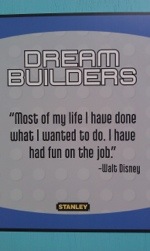*Note: This post is written for my staff, but feel free to join us!
A Creative Life is a Healthy Life by Amanda Enayati for CNN.com describes all the reasons for leading a creative life and to be innovators in our work, as well as ways to deal with the distractors.

*Found this quote posted in EPCOT during spring break
Related…
I was first introduced to the 3-2-1 formative assessment tool by Rick Wormeli at one of his conferences run through Staff Development for Educators (SDE). It is an assessment that asks the student to list three, two and one items related to a concept they just learned. An example he provided in mathematics looks like this:
3 – List three applications for slope, y-intercept knowledge in the professional world
2 – Identify two skills students must have in order to determine slop and y-intercept from a set of points on a plane
1 – If (x1, y1) are the coordinates of a point W in a plane, and (x2, y2) are the coordinates of a different point Y, then the slope of line WY is what?
Cross this idea with Barb Gilman’s tweet, “I love my principal! She challenged us to read at least 5 good books this summer. #BookChat #TitleTalk”, and you have the 3-2-1 challenge.
Using his format, I am challenging all of us (including me) with these suggestions during our time away from school.
3 – Read at least three good books this summer
To be literacy leaders in our classrooms, we have to be readers and writers in our personal lives too. Regie Routman said it best in Teaching Essentials: “One of the first questions I would ask any teacher seeking employment is, What are you reading? What is your last favorite book? How do you choose a book? What have you learned as a reader?“. She goes on to state that we need to have a balance in our knowledge base, and reading a wide variety of genres can provide this. For me, I plan to read Steve Jobs’ biography, the third installment in the Game of Thrones fantasy series and Opening Minds by Peter Johnston. I will also be reading new children’s literature in search of potential read alouds in classrooms for next year.
2 – Participate in two new experiences
Think about your new students coming in next fall. They will be feeling anxious about who their new teacher is, what is expected of them academically and how they will get along with their classmates. Our students take part in new experiences annually. It might be wise to put ourselves in their place to get a better perspective. I am not talking about climbing Mount Everest; maybe it is becoming more familiar with mobile technology, or taking an art class. If you cannot think of something new, maybe consider mastering something you have already tried. The article I reference in the beginning of this post has some good ideas.
1 – Think about one way you could use the Internet to communicate with families
I have sat in many meetings with parents who state, “I looked on the Internet for the answer to that problem.” We have a captive audience online. This challenge could be as simple as learning how to post your weekly classroom newsletters on the district web page instead of putting them in the shared folder. You could take this a step further and replace your classroom newsletter with a blog, where you could add photos, web links, video and audio alongside the text. Some classrooms in other schools use Twitter to share their reflections of what they learned during class. Whatever your preference, using communication tools on the Internet such as social media can be a powerful way to get the word out about the great things you do in school everyday. As always, I am available for questions and assistance, even during the summer. (As I reflect as I write, this challenge could serve as a new experience, too.)
None of these suggestions are required, or course, only challenges. I just want to encourage everyone to take time for yourself, as well as to reflect and think about how you will continue to grow and learn as a person and as a professional. Many of you do this already, so I may be preaching to the choir.
At any rate, have a wonderful summer and thank you for making my first year at Howe a good one!


Matt, I recently read an interesting question….”When was the last time you tried something for the first time?”
LikeLike
Great comment Colette! I should share that on Twitter. Who said it?
LikeLike
I’m stumped on something new to try, but have been reading a lot. 🙂
LikeLike
What have you been reading? I just started Opening Minds, a nice continuation of Choice Words, both by Peter Johnston.
A new experience for me fell in my lap. Yesterday my wife decided that the old raspberry plants had to go. Like now. Once the area was cleared out, we thought it would be a nice spot for a raised bed for vegetables. However, it is probably too late in the season to start one, so I have decided to try “green manure”. It’s not as gross as it sounds. You grow an annual cover crop, like rye or clover. In the fall, you mow it back and then till the cover crop into the soil. The decomposing plant material serves as a fertilizer for next year’s plantings.
Not sure if it will work like it says in my garden resources, but it will be fun to try and find out.
LikeLike